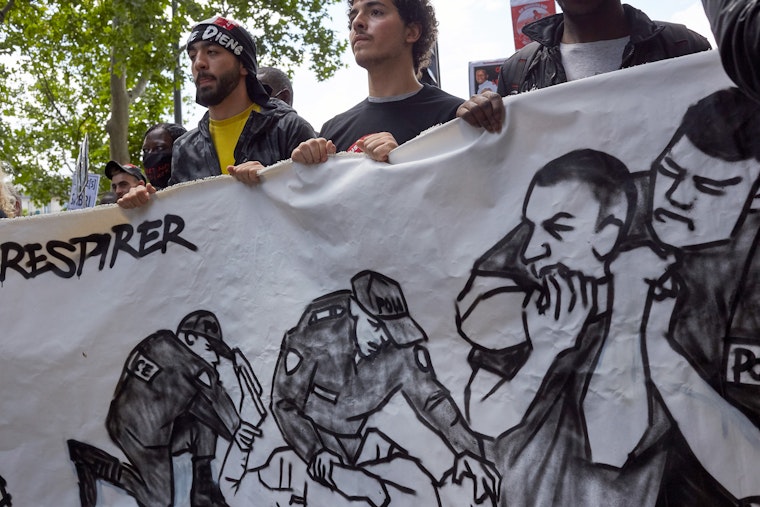Ending Ethnic Profiling to Keep Our Communities Safe
By Maryam H'madoun

More than 15 years ago, three teenage boys—15-year-old Bouna Traore, Zyed Benna, and Muhittin Altun, both 17—were playing football in Clichy-sous-Bois, a suburb of Paris. It was nearing time to head home and break their Ramadan fast when they saw police cars approaching them. The boys, aware of the long history of lengthy and discriminatory stop-and-searches in their neighborhood, decided to run, which led to a police chase.
Unknowingly, the boys ran in the direction of a construction site that held a high-voltage electrical power substation. Upon entering the site, Bouna and Zyed accidentally hit the transformer and were killed. Muhittin survived with severe burns. This led to weeks of massive protests in France because the police had chased the children to their death. Activists called for changes to policing practices.
From this tragedy, France became an important country to challenge ethnic profiling in Europe. It is also when the Open Society Justice Initiative became involved with policing and anti-discrimination work throughout the region. In the years since, we have helped address widespread, systemic discrimination through documentation in various countries (see here, here, and here), and supported the efforts of grassroots activists and leaders as they work to promote safe communities, propose policy changes, and demand police accountability, using strategic litigation, among other tools.
We have stood in solidarity with campaigners and organizers, who have worked tirelessly to challenge police brutality and discrimination. Efforts the Justice Initiative hopes to sustain through the publication of our new guide, Challenging Ethnic Profiling in Europe, which draws on expert interviews, resources, and case studies for anyone interested in ending ethnic profiling and keeping communities safe.
Today, Europe faces immense challenges with structural racism in all sectors—from policing and education to housing and healthcare. Many in Europe believe that institutional racism in policing is mostly an American problem, but anyone with firsthand knowledge of living in a racialized community in Europe will beg to differ. The murder of George Floyd in Minnesota last summer triggered thousands of Europeans to protest in the streets against police brutality and racism on their own soil.
In the UK this year, people are marking the long struggle against racist policing of Black neighborhoods on the 40th anniversary of the Brixton uprisings. The uprisings arose from a lack of employment opportunities for Black people in the local community and widespread experiences with policing discrimination. Forty years later, the government is still pushing through new policing legislation that will extend police powers and only increase racial harms.
In January, minority youth in Brussels clashed with police after the death of a 23-year-old Black man in police custody. Both the French and Spanish governments are facing lawsuits over discriminatory police checks. Under the guise of “protecting” against the COVID-19 pandemic, Roma communities in Central and Eastern Europe experienced increased police repression.
Our guide stands out as a tool for advocates and activists for several reasons:
First, the guide covers a wide range of topics from understanding the problem of ethnic profiling to different methods and tools used to document its practice. It also explains various ways to use the law and provides advice around strategically engaging with communities, police, policy officials, and media.
Second, it includes experiences and testimonies around issues of sustainability and self-care, addressing racism or conflicts within movements, the slow pace of change, and caring for your body and mind when your community is under threat. In one interview, an activist described the toll it took on him and his family when local media “pitted activists and community members against each other.” It is our hope that no matter where people are in their struggle against ethnic profiling, campaigners and organizers could find shared experience and learning to guide them in their work.
Third, the guide is filled with real world examples and practical tools and lessons from the experience of activists on the frontlines, whose voices are also reflected throughout. The case studies offer valuable lessons to activist and communities seeking an end to ethnic profiling, from what can happen when filing a legal complaint goes wrong to the impact of using comics to convey complex legal arguments.
Fourth, although the guide is designed and written for the purpose of addressing ethnic profiling in Europe, the lessons, approach, and strategies in the guide can apply to different contexts, such as the US and Latin America, and even other issues of discrimination that result from structural racism. Communities across these regions are coming to a reckoning with racial and ethnic discrimination, and this guide can serve activists and communities working to combat the problem.
Lastly, the guide celebrates the achievements of the activists and grassroots organizations challenging ethnic profiling and calling out structural racism in Europe. With the realities of racist policing so often denied, lifting up and celebrating the tremendous work of campaigners and organizers in Europe, is crucial.
The #BlackLivesMatter protests last summer created an opening for genuine political change. More than ever, activists and advocates from all generations are rising up in every country—collaborating and learning from each other on how to end discrimination in policing.
We hope this guide is one more tool to bring about long, overdue change.